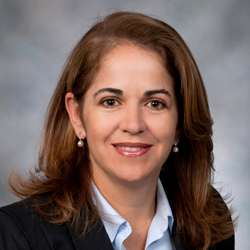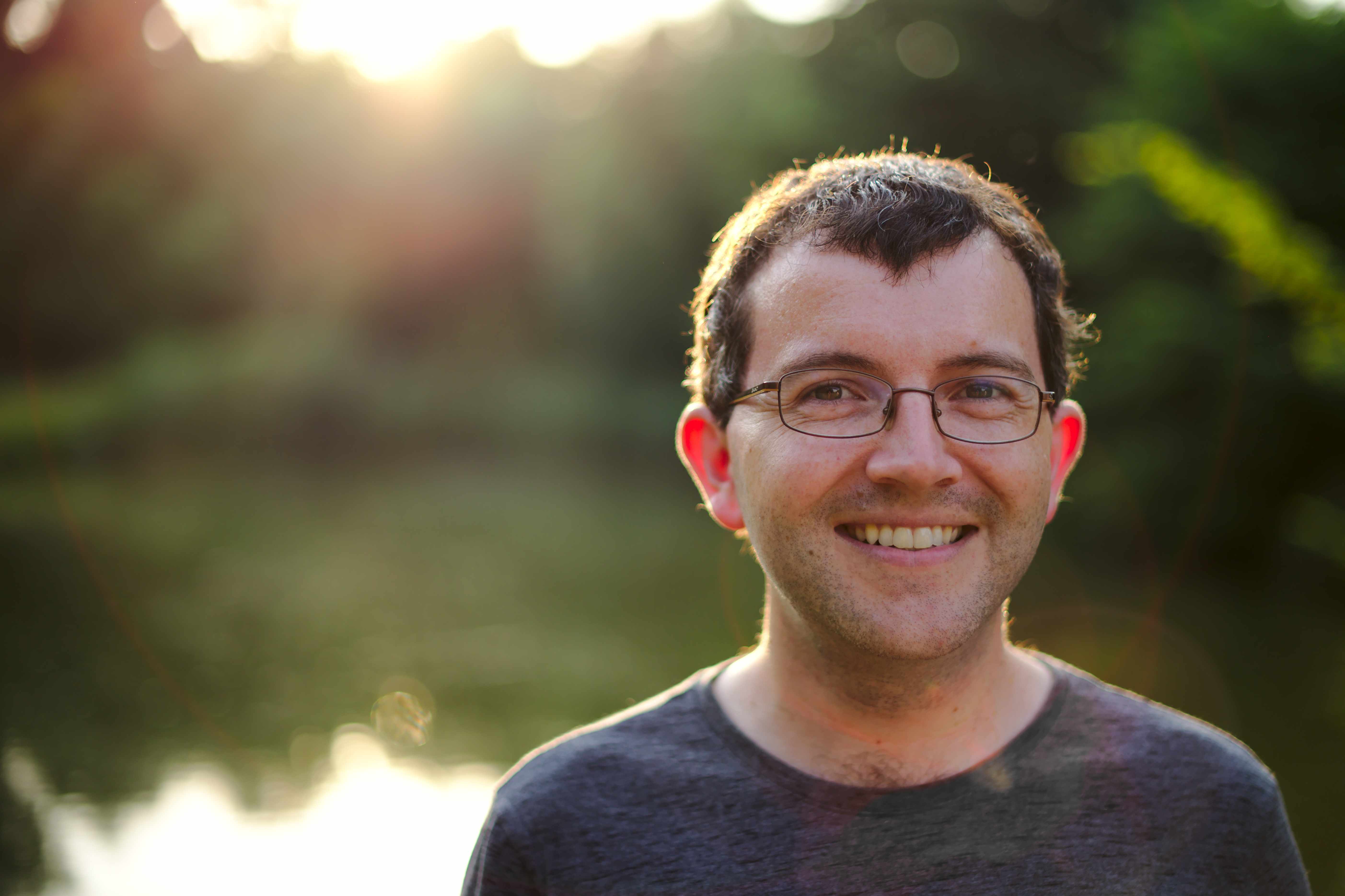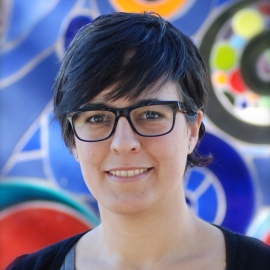Costa Rican Faculty & Staff at Rice
Erika de la Garza

Erika de la Garza, Program Director of the Latin America Initiative at the Baker Institute
- Why do you choose to work and research at Rice University?
“Rice is an amazing place to work! I ended up working here by “chance” while my husband was a Rice PhD student. I can’t think of a better place to have spent over 15 years of my professional life. Rice offers a work environment where you can reach out to friendly approachable experts and intellectuals across many fields, be stimulated by energetic students who have done three times as much as you had at their age, find numerous opportunities to get involved in the Rice and Houston communities and be continuously motivated to keep growing and learning. All of this takes place in a university campus surrounded by gorgeous oak trees, beautiful architecture and impressive art pieces! ”
- Why students, scholars and researchers from Costa Rica can benefit from working and studying at Rice?
“For students –especially Tico students-, Rice’s size, location, and learning environment are unparalleled. The college system offers a unique sense of belonging that is critical when one is away from home. It provides students with a group of people they can identify with and engage in social activities and sports, as well as, seek for academic tutoring and advise.
Costa Rican researchers and scholars would feel at home at Rice given its manageable size, and easily approachable colleagues. Being exposed to Rice’s highly motivated and stimulating faculty and student body is an opportunity not to be missed.”
- What makes Rice unique from other places?
“The people that work and study at Rice, make it unique. It’s location, in a vibrant, multicultural city just a few hours away from Costa Rica and other Latin American countries is also a big plus, despite the heat!”
- What’s your favorite thing about Rice?
“It’s hard to choose one thing to call “my favorite” about Rice but to have the opportunity to engage in stimulating conversations every day without having to be in a classroom is amazing!”
Bio:
Erika de la Garza is the program director of the Latin America Initiative at the Baker Institute. Her chief areas of interest include U.S.-Latin America relations; emerging leadership; coalition building between public, private and civil society actors; and trade and business development in Latin America.
She oversees research on current events facing the region, especially relating to economic development, politics and institution building. She also organizes lectures and other programs to increase awareness about Latin America and to foster a better understanding between the countries of this hemisphere. Prior to joining the institute, she worked for several years encouraging foreign direct investment in Costa Rica, her home country.
She holds a master’s degree in international affairs from Columbia University in New York and a master’s degree in diplomacy from the University of Costa Rica.
Anthony Várilly-Alvarado
1. Why do you choose to teach and research at Rice University?

Anthony Várilly-Alvarado, Associate Professor of Mathematics
One thing that attracted me to Rice is its commitment to and appreciation of *both* research and teaching. I was an Instructor in the Mathematics department for three years before joining the faculty as a tenure-track member. I got to experience the care faculty here take at all levels of mentoring, be it with undergraduates in the classroom or in summer research projects, or through a well-structured doctoral program that offers courses on recent developments, or its robust Instructorship program that constantly injects energy into the research activity of a department. I liked its student population size, and the fact that it’s in a large city, where one can enjoy the benefits of concentration.
2. Why students, scholars and researcher can benefit from Rice University?
This is a world class university, with incredible opportunities to do research and to *create communities* to develop research programs. The development of knowledge being ingrained in the culture of the university, we constantly rethink and redevelop our course offerings to stay ahead of the curve. Learning never stops.
3. What makes Rice unique from other places?
Rice has a rare combination of individuals at every level who are talented, dedicated to their scholarship and the transmission of knowledge, and who care for each other. It feels like a family to me; when my students and colleagues celebrate, I am thrilled to celebrate with them. When they are hurting, I hurt too. You get the feeling that we are like iron filings, pointing in the same direction, with clarity and purpose.
4. What’s your favorite thing about Rice?
That’s easy: its students. They are the university’s greatest asset. Rice students are the hardest working students I’ve seen in my career. I put a lot of effort into my classes, but in return I demand a lot from my students. They always rise to the challenge, and this continually amazes me.
Bio:
Prof. Varilly-Alvarado was born and raised in Costa Rica, where he attended the British School of Costa Rica and completed the International Baccalaureate program. After High School, he came to the Unites States, where he studied Mathematics at Harvard University. He spent a year at the University of Cambridge, in Emmanuel College, where he completed Part III of the Mathematical Tripos, before moving back to the United States to get his Ph. D. in Mathematics at the University of California at Berkeley, under the supervision of Bjorn Poonen. In 2009 he came to Rice University as a G. C. Evans Instructor. He has been here since then, having been appointed Assistant Professor in 2012, and most recently Associate Professor in 2016. He has spent time as an academic visitor at the Universite de Rennes 1 and the Ecole Polytechnique Federale de Lausanne.
Prof. Varilly-Alvarado’s research is centered on the study of solutions to systems of polynomial equations whose coordinates involve only rational numbers (like 19, or -3/5). He specializes on systems whose geometric avatars consist of surfaces over the complex numbers, especially K3 surfaces. Such surfaces have an incredibly rich geometry, which bears on their rational points in ways that we are still trying to understand.
*Professor Varilly-Alvarado receives Superior Teaching Award
Each year the George R. Brown Award for Superior Teaching honors top Rice professors as determined by the votes of the alumni who graduated two to five years ago. This year Professor Anthony Varilly-Alvarado was among those selected. More from the Rice News.
Andrea Ballestero S.

Andrea Ballestero S., Assistant Professor of Anthropology
1. Why do you choose to teach and research at Rice University?
Rice is a top research university that is committed to one-on-one training and mentoring. I am excited about the research possibilities and the quality of our students. It is a great environment for the generation of new ideas and the exploration of taken for granted truths.
2. Why students, scholars and researcher can benefit from Rice University?
At Rice you will find a community of scholars and students with a joint objective: pursuing the best work we all can. Because this is a collective endeavor, collaboration and peer-to-peer mentorship are crucial. That creates an environment where students and faculty find support and community, rather than pursuing their goals in isolation from their peers.
3. What’s your favorite thing about Rice?
The open mindedness of our students. Their adventurous and curious intellectual spirit.
Bio:


